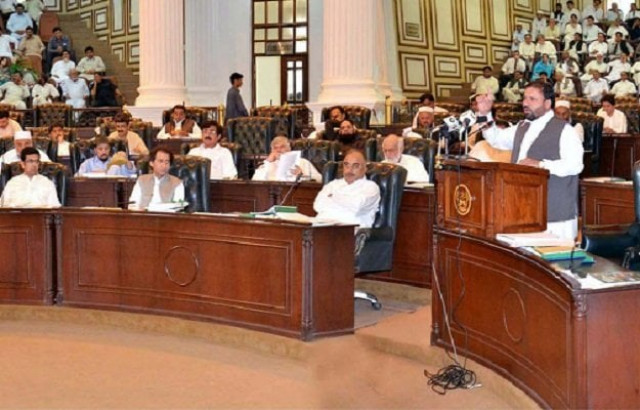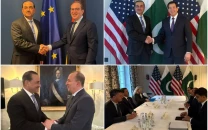Focus on empowering LGs
One-third of development funds allocated to district and local govts

One-third of development funds allocated to district and local govts. PHOTO: INP
The Pakistan Tehreek-e-Insaf appears to be making good on its word to empower elected local governments with fiscal autonomy, allocating an unprecedented amount of money for sub-provincial level governments in the Rs488 billion Khyber-Pakhtunkhwa budget for fiscal year 2016.
Finance Minister Muzaffar Said presented the budget in the Khyber-Pakhtunkhwa Assembly on Monday. The Rs488 billion budget is 21% larger than the outgoing fiscal year’s budget, and has an allocation for development projects of Rs175 billion, nearly 26% larger than fiscal 2015.
More than one-third of the development budget will be allocated for district and local governments to decide how to spend. The next largest allocations for development are in education, and infrastructure development, including drinking water and sanitation infrastructure.
Like the previous year, the new budget claims to introduce no new taxes. However, the rates on some existing taxes have been increased. These include an increase on commercial property tax, motor vehicle tax, the tax on CNG stations, petrol pumps and service stations along with an increase in tax rates on route permits for commercial vehicles, parking fees and others, said the minister while delivering his long budget speech.
Revenues
As with all provincial governments, the bulk of the K-P government’s revenues come from the federal government. Peshawar is expecting to get Rs250 billion from its share in federal taxes in fiscal 2016, which is 10% more than the previous year. The province will get another Rs30.1 billion on account of the 1% of the federal divisible pool to which K-P is entitled due to its frontline status in the war on terror. It will also get another Rs27.5 billion in direct transfers from the federal government.
K-P estimates it will be able to collect Rs37.1 billion from provincial tax and non-tax revenues, another Rs19.4 billion from oil and gas royalties, Rs51.9 billion from net federal arrears from hydroelectric power profits and Rs17billion in current net hydroelectric power profits, Rs3.3 billion from its own hydroelectric power generation and Rs8 billion from timber. The province is also expecting to get Rs32.9 billion in foreign aid for its development budget.
Expenditures
In terms of current expenditures, the province plans to spend Rs298 billion, including Rs177 billion for general public service, Rs14.2 billion for civil defence, Rs41.4 billion for law enforcement, Rs18.1 billion for economic affairs, Rs46.9 million for environmental protection and Rs8.5 billion for housing. Similarly, Rs16.7 billion have been allocated for health, Rs28.5 billion for education while Rs6.6 billion have been allocated for social protection programmes.
Annual Development Programme
Approximately 18.8% of the Rs175 billion development budget will be funded with foreign aid. The money will be spent on 1,525 development projects, which include 911 ongoing projects and 614 new. “We have set aside more funds for the already running projects to provide quick relief and benefit to the public,” said Said.
Within the development budget, 21% will be spent on district governments, followed by another 13% on local government. Education will get 11%, roads 10% and drinking water 5%.
Salaries and pensions
Said announced a 10% salary and pensions raise for government employees with a 25% increase in medical allowance, in line with the federal government’s announcement this year. Employees from grades 1-5 were also granted a two pay-scale upgrade, while those in grades 6-16 were upgraded by one pay scale.
The minister did not announce an increase in the monthly minimum wage, unlike the federal and other provincial governments, with announced a raise from Rs12,000 to Rs13,000 per month.
Supplementary budget
Said also presented a supplementary budget of Rs26.9 billion for fiscal year 2015. It included Rs15.9 billion for current expenditure and Rs10.5 billion for developmental projects.
Opposition parties, including the Awami National Party (ANP), Pakistan Peoples Party (PPP) and Jamiat Ulema-e-Islam, boycotted the session and protested on the floor chanting “shame, shame” at the start of the budget speech.
Published in The Express Tribune, June 16th, 2015.



















COMMENTS
Comments are moderated and generally will be posted if they are on-topic and not abusive.
For more information, please see our Comments FAQ